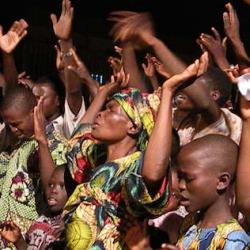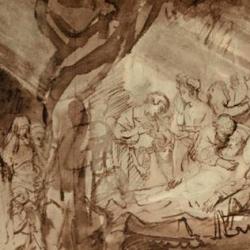Oil is an extremely important part of the biblical world in a number of ways. Oil is a food. Oil is used for cooking. Oil is placed on grain offerings that are baked or fried before being offered to Yahweh (Leviticus 2), and the bread on the table of showbread is baked with oil (Exodus 29:2). Because of its property as a food, the word is sometimes translated as “fatness,” which can describe the fertility of a land or the prosperity of a people. “Fertile valley” in Isaiah 28:1 is actually “oily valley.” By the same token, the failure of the olive tree is a sign of famine, loss of food and fatness. Fertile olive trees represent the righteous in the house of God (Psalms 52:8), and children are olive trees around our table (Psalm 128:3).
Oil for lamps. Oil keeps lights going. When they begin to gather materials for the tabernacle, the Israelites bring oil for light as well as for anointing )Exodus 25:6). Pure beaten olive oil is used in the lampstand (Exodus 27:20). The beaten oil of the lamps has to be replenished regularly so that the lamp burns continuously. Not only does oil make fire burn in lamps, but oil is, visually, as James Jordan notes, liquid light. Makes light, and also golden like light.
Oil’s life-cycle is like the human life-cycle, like the life-cycle of wine. Grapes grow, they are crushed, and from their crushing and aging we get wine. Olives grow, they are crushed, and from the crushing we get oil that brightens the face and lights lamps. We have to be crushed in order to light lamps, our own or others. Suffering squeezes the oil from us.
Of course, oil also used in religious and political rituals for anointing priests and kings. There is a special olive oil made for the priests who serve at the tabernacle (Exodus 30:22-33), and this same olive oil is used for anointing other furnishings of the tabernacle (Exodus 30:22-33; 40:9). The common anointing joins the priests and the rest of the tabernacle. They are together consecrated and enlivened by the oil. They are made an anointed place, a Christic place. The whole tabernacle is christened. By virtue of the anointing, the priests become olive trees, children at the table of their Father Yahweh. They become lamps burning to light Israel.
Our very identity as Christians is oil-based. Christ means “Anointed One,” and insofar as we are in Christ, we are “anointed.” Jesus is anointed with the Spirit (Isaiah 61:1; Luke 4:18; Acts 10:38), and insofar as we share the Spirit of Jesus we too are lampstands in His house, olive trees at His table. We are to be virgins who keep our lamps burning in preparation for the coming of the bridegroom.











